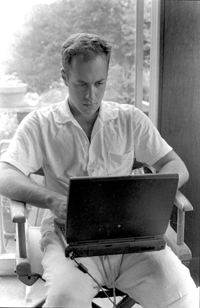 |
 |
 |
 |
|
STRADDLING ARTISTIC WORLDS CONTINUED [ 2 OF 2
] Some of the journal's soul-searching topics included the value and political impact of graffiti art and fatherhood's impact on hip hop artists. Mansbach also published an essay by Marsalis titled "The Art of Hip Hop?" a provocative question about whether, in fact, the genre could be classified as art. Throughout, Mansbach says, "Columbia was really helpful and supportive to me," financially and academically, allowing him to take six independent study credits for three consecutive semesters while publishing the journal. "Someone told me," he said with a laugh, "that I set a record for taking the most independent study credits."
By this point, Mansbach, then a junior, had started to write. He received a grant from the English Department, the Richmond B. Williams Traveling Fellowship, which allowed for him to study hip hop in Eastern Europe. "Studying" involved linking up with two musicians and doing vocals in a "rap, hip hop, jazz trio" that played on street corners from Prague to Amsterdam to London. "The research was extremely informal," he admits, adding, "but I learned a lot." Back at Columbia, Mansbach concentrated on getting more grants that would allow for him to write. "I was always up in the English office talking to Michael Mallick [the department coordinator]," he recalls. "I got cool with him. I'd walk in and say, 'Yo! Where's the money?' "Whether they liked what I was doing, or no one else applied," Mansbach muses, the department continued to support his work. He estimates that he was awarded six or seven separate grants that totaled as much as $30,000. The last one, the Karen Osney Brownstein prize, was enough to support him the summer after graduation before he started his M.F.A. at Columbia's creative writing program, when he toiled away on Shackling Water. Simultaneously, he was working on a book of poetry, Genius B-Boys Cynics Getting Weeded in the Garden of Delight (Subway & Elevated, 2001). Shackling Water drew mostly critical praise. Adam Baer noted in The New York Times that Mansbach "displays a gift for fusing the improvised energy of street speak with that of spiraling jazz riffs." The Boston Globe's Amanda Heller allowed that while Mansbach can speak out of character, the end product is an exhilarating "style assault." Michael Eric Dyson, who contributed a quote to Mansbach's cover, praises him for his "lean, elegant sentences and sharp insightful prose." But Mansbach's interest in race, his protagonist's being from the inner city in Boston, and even his way of adopting vernacular jive at his readings has struck some as jarring. Who is this white guy from Newton, and how can he write a black protagonist? "I was very skeptical that someone white could write [a black protagonist]," acknowledges The Washington Post's Natalie Hopkinson. Yet, as she wrote in an advance piece for the Post, "About halfway through the novel, many of the questions that its authorship raises - 'Does this white boy know what he's talking about?' - are forgotten, and it becomes a simple story about a young artist struggling to find his voice." Still, that's a question that Mansbach encourages people to ask. "I'm trying to foster that conversation about race," he says. "Especially when I speak at schools, I am waiting for people to bring [that question] up. "I've always taken the privilege of being allowed to participate in black culture very seriously," says Mansbach. "I encourage a certain amount of suspicion. I try to be self-critical and honest and come at it from a place of love. "So why is it that I'm into James Baldwin and Ralph Ellison and Richard Wright, as opposed to white authors and musicians?" he asks. "It's not about race as much as aesthetic and emotional sensibility, and where you find that sensibility is here." Of his book readings, he acknowledges, "It's certainly going to be some people's first experience with hip hop. Part of my agenda is to make people reconsider their notions about where they place certain [artistic] forms in their hierarchies." Dyson adds, "His love and appreciation for black culture has spurred him to be that much sharper, more critical. It's yielded a high degree of insight. I understand the resistance, but this young man should be listened to and heard from. He has thought long and hard about issues, not only about black people but also about American culture." For now, Mansbach is turning back to his Judaic roots for his
next book, which is about an Afrocentric white Jewish boy - a
topic, it appears, that is similarly close to his heart. [ home ] |
|
||||||||||||||||||||||||||||||||||||||||||||
